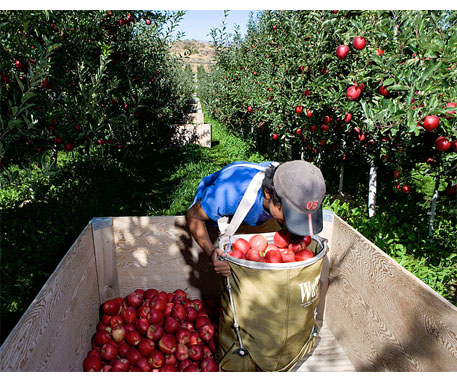TAKE A STAND!
Who gets represented in rural communities?
Some Republicans are working hard to keep their constituents’ wages low
The following story appears in the Washington State Labor Council’s 2017 Legislative Report published in August.
By ERIC GONZALEZ
Republicans offered a series of attacks on working families this session, some that impact the rural workforce in towns, cities and counties they represent.
 The rural economy is critically important to the health of our state’s economy. Washington state produces $10.7 billion in commodities per year. Apples make up 22%, or $2.4 billion, of that but also think potatoes, wheat, sweet cherries, grapes, hops, and more. Despite the tremendous amount of wealth created in this industry, the Employment Security Department reports that the average annual salary of crop workers is less than $23,000, below the poverty line for a family of four.
The rural economy is critically important to the health of our state’s economy. Washington state produces $10.7 billion in commodities per year. Apples make up 22%, or $2.4 billion, of that but also think potatoes, wheat, sweet cherries, grapes, hops, and more. Despite the tremendous amount of wealth created in this industry, the Employment Security Department reports that the average annual salary of crop workers is less than $23,000, below the poverty line for a family of four.
Federal laws exacerbate this income inequality. Agricultural workers are exempt from the overtime pay and other protections of the National Labor Relations Act. Put simply, there are systemic inequities that continue to oppress and discriminate against people of color and low-wage agricultural workers.
So what happens when a court rules that farmworkers were unfairly denied pay, or when voters raise the state minimum wage? Some legislators sent from rural areas to represent those workers do their best to take away those gains.
SB 5720, sponsored by Sen. Brad Hawkins (R-East Wenatchee), set out to deny agricultural workers their right to recover in court the full amount on their unpaid wages, including miscalculated rest break compensation. It would also allow employers to avoid responsibility for payment of wages for work performed outside production, such as attending meetings, waiting for equipment to get repaired or replaced, or traveling between worksites.
Our state’s agricultural industry depends on a healthy and willing workforce, but big employers like Stemilt Growers, Kershaw Companies, and Auvil Fruit Company, along with the Washington Tree Fruit Association, actively supported SB 5720. This bill is unfair to workers and their families, and drives wages even lower. A version of this bill passed the Senate 28-18 (see Vote #3) but rightfully died in the House.
Sen. Michael Baumgartner (R-Spokane) introduced SB 5530 to delay implementation of Initiative 1433 by two years in all counties except King County. I-1433, approved by nearly 60 percent of voters in 2016, raises the minimum wage to $13.50 by 2020 and allows all workers to earn some paid sick and safe leave, which is important both to working families and to public health. But apparently, Baumgartner believes his own constituents should get lower wages and less sick leave than the people of King County. (It’s worth noting that, even if you threw out every vote that was cast in King County, I-1433 would still have passed.)
Other examples of rural legislators taking a shot at their own constituents in 2017 were:
► Rep. Cary Condotta (R-East Wenatchee) sponsored HB 2065 to regionalize the state minimum wage and have a lower one in “nonurban” areas (like his), and to block cities and counties from setting higher wage standards.
► Rep. Brad Klippert (R-Kennewick) wrote HB 1724, helpfully titled “Reducing the minimum wage.” It finds that voters made a mistake by raising it too high, so he aimed to cut it. Plus, he wanted a sub-minimum wage for teenagers.
All of these bills failed, but the message is clear: when some GOP legislators claim to represent the interests of the rural economy, they don’t mean the people who live there.
Click here to see more reports from the Washington State Labor Council’s 2017 Legislative Report. Or download the entire 8-page PDF.





